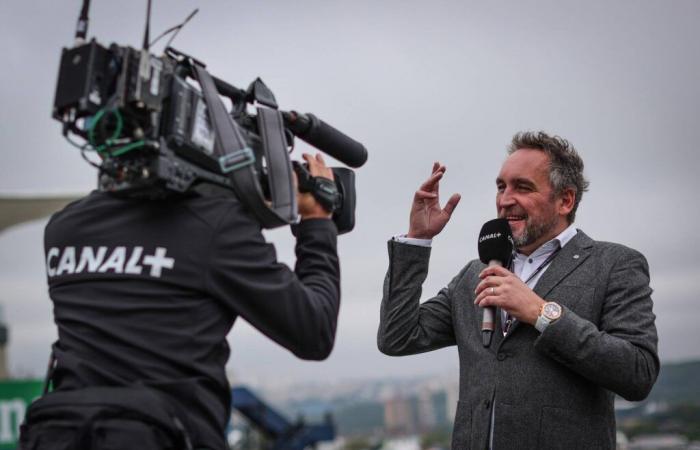
He is on the Formula 1 circuits every weekend, twirling between the cars on the grid, trying to sneak as close as possible to the garages to observe the particularities and changes of each car, and has no equal when describing precisely each route of a circuit… He is Franck Montagny, former F1 driver and Canal + consultant.
He knows Formula 1 by heart and has seen his sport grow in popularity over the years. Nice-Matin asked him to decipher this growing success and also his feelings regarding the extension of the contract until 2031.
It is now confirmed, the Monaco GP will continue for several years. What makes this race so special compared to others?
There are no others like it. Monaco is the jewel of Formula 1. Monaco is historic, it would have been such a shame if it was no longer on the calendar. It’s such an atypical Grand Prix, so different from the others. Really, almost everything depends on qualifying, therefore on the day before the race. But things happen all the time. The grid is never as armored as for the Monaco Grand Prix. It's quite special.
And driving cars like Formula 1 cars in such narrow streets in the Principality is still a real challenge for the drivers who do not find it elsewhere on another urban track.
Then for us it’s a bit like the national Grand Prix. Now that there is no longer the French Grand Prix, it is still a moment that we cherish and particularly appreciate at Canal. We have a lot of people on site, we handle absolutely all the races. It's pretty awesome. And then once again, Monaco is a very, very special setting. In general it's not far from the Cannes Film Festival, we have a lot of stars who come. I think this is the only time I wear a costume.
Formerly a sport reserved for a male audience, Formula 1 has become a real popular success. Why is it so popular?
Formula 1 has changed its audience a little. Sport is “out of date”, we have lowered the standard. Before we had a slightly older audience and today thanks to platforms and social networks, we have interested a younger audience. Before we treated Formula 1 in a certain way and today, particularly with Canal, we do all the tests, we do all the reports, we do all the insides, we do all the races etc, we really decipher F1.
Nowadays, people see something other than a guy in a car doing tricks, or who is doing circles. He is more interested in the human aspect, more in the technical aspect. It's very positive. This sport has really exploded and today it is no longer just a sport for the “rich”. It's a sport that young women and men dream of, from karting to F1.
As Lewis Hamilton says, you always have to believe in your dreams and today it feels like anyone could make it to F1. In quotes of course, but it has become democratized and it is a dream that is attainable for many people.
Older F1 fans will say that the current popular success and interest of a new audience is due to the Netflix series. Actors are taking shares in teams like Alpine. Even Brad Pitt is making a film on the subject. When did you realize that the sport was growing in popularity over the years?
It was very evolving. We really noticed it and it's very stupid, in terms of the travel time between the hotels and the circuit. Today we know that at a minimum, and yet we are not staying far away, we need an hour, before we needed 15 minutes. Because it's really very popular, there are a lot of people who come and today F1, every Grand Prix, there is something other than a car race. There are support races which are interesting, there are concerts, it's a real party in fact.
At the beginning of October, LVMH announced a 10-year partnership with F1.
F1 is about cycles. When a big group like LVMH invests, it's very, very good. We have two French drivers, we have a French team. It is important that this sport counts in our country and that it is financially interesting. I still remember the time when I was riding and finding French companies for sponsorship. Investing in F1 was very complicated.
We see it at every Grand Prix, the grandstands of the circuits are full to bursting, over the three days of competition. How do you appreciate this popularity in your work? Is it difficult to address both enthusiasts for years and newly arrived fans?
There was the whole era when we were absolute fans of Ayrton Senna, Alain Prost, the great heroes of Formula 1 past. Today, we are more interested in what happens on a daily basis, particularly in the race itself. I think it's great that fans have heroes like that. But today, there are a lot more races and it's true that young people are not necessarily going to know who Ayrton Senna, Alain Prost is. On the other hand, they will know exactly how many races Max Verstappen has won this year, how many pole positions he has had, things like that.
So it really changed. I think the history of Formula 1 remains a history of Formula 1 for serious enthusiasts. But today, it's a bit like social life, like Instagram and stuff like that. We're going to be interested in Formula 1 for a while, because we want to live that experience. We are going to see a Grand Prix and we are going to enjoy it. For us, there are more people, more activities, more things to experience, more things to talk about.





